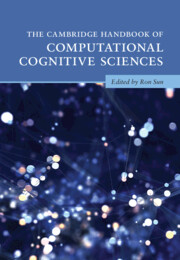Book contents
- The Cambridge Handbook of Computational Cognitive Sciences
- Cambridge Handbooks in Psychology
- The Cambridge Handbook of Computational Cognitive Sciences
- Copyright page
- Contents
- Preface
- Contributors
- Part I Introduction
- Part II Cognitive Modeling Paradigms
- Part III Computational Modeling of Basic Cognitive Functionalities
- 11 Computational Models of Categorization
- 12 Computational Cognitive Neuroscience Models of Categorization
- 13 Models of Inductive Reasoning
- 14 Analogy and Similarity
- 15 Mental Models and Algorithms of Deduction
- 16 Computational Models of Decision Making
- 17 Computational Models of Skill Acquisition
- 18 Computational Models of Episodic Memory
- 19 Computational Neuroscience Models of Working Memory
- 20 Neurocomputational Models of Cognitive Control
- 21 Computational Models of Animal and Human Associative Learning
- 22 Computational Cognitive Models of Reinforcement Learning
- Part IV Computational Modeling in Various Cognitive Fields
- Part V General Discussion
- Index
- References
19 - Computational Neuroscience Models of Working Memory
from Part III - Computational Modeling of Basic Cognitive Functionalities
Published online by Cambridge University Press: 21 April 2023
- The Cambridge Handbook of Computational Cognitive Sciences
- Cambridge Handbooks in Psychology
- The Cambridge Handbook of Computational Cognitive Sciences
- Copyright page
- Contents
- Preface
- Contributors
- Part I Introduction
- Part II Cognitive Modeling Paradigms
- Part III Computational Modeling of Basic Cognitive Functionalities
- 11 Computational Models of Categorization
- 12 Computational Cognitive Neuroscience Models of Categorization
- 13 Models of Inductive Reasoning
- 14 Analogy and Similarity
- 15 Mental Models and Algorithms of Deduction
- 16 Computational Models of Decision Making
- 17 Computational Models of Skill Acquisition
- 18 Computational Models of Episodic Memory
- 19 Computational Neuroscience Models of Working Memory
- 20 Neurocomputational Models of Cognitive Control
- 21 Computational Models of Animal and Human Associative Learning
- 22 Computational Cognitive Models of Reinforcement Learning
- Part IV Computational Modeling in Various Cognitive Fields
- Part V General Discussion
- Index
- References
Summary
The focus of this chapter is on neurobiologically informed and constrained models of working memory as defined by Miller, Galanter, and Pribram (1960): the holding of goals and subgoals in mind in service of planning and executing complex behaviors. In particular, the chapter focuses on models specifically addressing critical challenges and mechanisms following from the need for rapid and selective gating of working memory contents. To start, the important computational challenges posed by the tradeoff between maintaining vs. updating are discussed, providing motivation for the rest of the chapter.After that, several seminal models that have contributed to current thinking are reviewed, including the authors’ own PBWM framework that has proven influential. Finally, several recent developments from the deep learning and neurophysiology literatures are addressed and critical questions and some directions for future progress are discussed.
Keywords
Information
- Type
- Chapter
- Information
- The Cambridge Handbook of Computational Cognitive Sciences , pp. 611 - 663Publisher: Cambridge University PressPrint publication year: 2023
References
Accessibility standard: Unknown
Why this information is here
This section outlines the accessibility features of this content - including support for screen readers, full keyboard navigation and high-contrast display options. This may not be relevant for you.Accessibility Information
- 1
- Cited by
